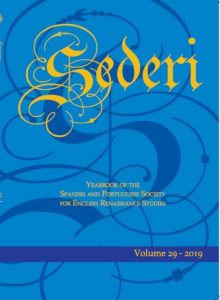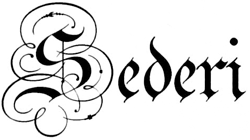
Sederi 29
Sederi 29 — 2019
EDITOR
Ana Sáez-Hidalgo
MANAGING EDITOR
Keith Gregor
REVIEW EDITOR
María José Mora
ISSN 1135-7789
Clark Hulse, “Ovid’s urban metamorphosis.” SEDERI 29 (2019): 85–108.
DOI: https://doi.org/10.34136/sederi.2019.4 Download PDF
Abstract
In Book XV of Ovid’s Metamorphoses, Pythagoras meditates on the rise and fall of cities and foresees that the survival of Rome requires turning from war to the “arts of peace.” Once ancient Rome has fallen, its urban imagery hybridizes with a Biblical counter-imagery in which God wills the ruination of Rome and other centers of wickedness. Through this Ovidian/Pythagorean lens, this essay then examines how Spenser confronts the fall and rise and possible fall again of early modern London, with glances also at Shakespeare and Dryden. This Ovidian model creates challenges of identity, belief, and ethical obligation that result in an “outward turn” of the theme of metamorphosis toward its social boundary.
Keywords: Ovid; Spenser; Shakespeare; Dryden; Metamorphosis; City; Rome; London.
References
Beard, Mary. 2015. SPQR: A History of Ancient Rome. New York: Liveright.
Braden, Gordon. 2000. “Ovid, Petrarch, and Shakespeare’s Sonnets.” In Shakespeare’s Ovid: The Metamorphoses in the Plays and Poems, edited by A. B. Taylor, 105–10. Cambridge: Cambridge University Press.
Braunfels, Wolfgang. 1988. Urban Design in Western Europe: Regime and Architecture, 900–1900. Translated by Kenneth J. Northcott. Chicago: University of Chicago Press.
Bruegmann, Robert. 2005. Sprawl: A Compact History. Chicago: University of Chicago Press.
Burdett, Richard, ed. 2006. “Shrinking Cities.” In Cities: Architecture and Society, 10th International Architecture Exhibition, vol. 1, 316–23. Venice: Biennale di Venezia.
Burkert, Walter. (1962) 1972. Lore and Science in Ancient Pythagoreanism. Translated by Edwin L. Minar, Jr. Cambridge: Harvard University Press.
Davies, Jason P. 2004. Rome’s Religious History: Livy, Tacitus and Ammianus on their Gods. Cambridge: Cambridge University Press.
Dryden, John. 1995. The Poems of John Dryden, Vol. 1: 1649–1681. Edited by Paul Hammond. London, Longman.
Dryden, John. 2005. The Poems of John Dryden, Vol. 5: 1697–1700. Edited by Paul Hammond and David Hopkins. London, Longman.
Dyson, Stephen L. 1992. Community and Society in Roman Italy. Baltimore: Johns Hopkins University Press.
Dyson, Stephen L. 2010. Rome: A Living Portrait of an Ancient City. Baltimore: Johns Hopkins University Press.
Eisendrath, Rachel. 2018. Poetry and a World of Things: Aesthetics and Empiricism in Renaissance Ekphrasis. Chicago: University of Chicago Press.
Enterline, Lynn. 2000. The Rhetoric of the Body from Ovid to Shakespeare. Cambridge: Cambridge University Press.
Galinsky, Karl. 2007. “Continuity and Change: Religion in the Augustan Semi-Century.” In A Companion to Roman Religion, edited by Jörg Rüpke, 71–82. Oxford: Blackwell.
Gallagher, John. 2010. Reimaging Detroit: Opportunities for Redefining an American City. Detroit: Wayne State University Press.
Geoffrey of Monmouth. (c. 1139) 1958. History of the Kings of Britain. Translated by Sebastian Evans, revised by Charles W. Dunn. New York: E. P. Dutton.
Greenblatt, Stephen, et al., eds. 1997. The Norton Shakespeare. New York: Norton.
Hadfield, Andrew. 2010. Edmund Spenser: A Life. Oxford: Oxford University Press.
Hardie, Philip. 1969. Ovid’s Poetics of Illusion. Cambridge: Cambridge University Press.
Helfer, Rebeca. 2012. Spenser’s Ruins and the Art of Recollection. Toronto: University of Toronto Press.
Helgerson, Richard. 1992. Forms of Nationhood: The Elizabethan Writing of England. Chicago: University of Chicago Press.
Henslowe, Philip. (c. 1592–1609) 2002. Henslowe’s Diary. 2nd ed. Edited by R. A. Foakes. Cambridge: Cambridge University Press.
Hui, Andrew. 2016. The Poetics of Ruins in Renaissance Literature. New York: Fordham University Press.
Hulse, Clark. 1981. Metamorphic Verse: The Elizabethan Minor Epic. Princeton: Princeton University Press.
Hulse, Clark. 1988. “Spenser, Bacon and the Myth of Power.” In The Historical Renaissance New Essays on Tudor and Stuart Literature and Culture, edited by Heather Dubrow and Richard Strier, 316–46. Chicago: University of Chicago Press.
Karmon, David. 2011. The Ruin of the Eternal City: Antiquity and Preservation in Renaissance Rome. New York: Oxford University Press.
Lanzoni, Susan. 2018. Empathy: A History. New Haven: Yale University Press.
Liebeschuetz, J. H. W. G. 1979. Continuity and Change in Roman Religion. Oxford: Oxford University Press.
Livy [Titus Livius Patavinus]. (c. 27 B.C.E. – c. 14 A.D.) 1971. The Early History of Rome. Translated by Aubrey De Sélincourt. Harmondsworth: Penguin Books.
Maley, Willy. 2003. Nation, State, and Empire in English Renaissance Literature: Shakespeare to Milton. London: Palgrave Macmillan.
Manley, Lawrence. 1995. Literature and Culture in Early Modern London. Cambridge: Cambridge University Press.
Meres, Francis, M. A. 1598. Palladis Tamia: Wits Treasury Being the Second part of Wits Common wealth. London: P. Short, for Cuthbert Berbie.
Milosz, Czeslaw. 1953. The Captive Mind. Translated by Jane Zielonko. New York: Vintage.
Murrin, Michael J. 1990. “Cleopolis.” In The Spenser Encyclopedia, edited by A. Kent Hieatt et al., 168–69. Toronto: University of Toronto Press.
Ovid [Publius Ovidius Naso]. (8 A.D.) 1993. The Metamorphoses of Ovid. Translated by Allen Mandelbaum. New York: Harcourt Brace.
Parker, M. Pauline. 1960. The Allegory of ‘The Faerie Queene.” Oxford: Clarendon Press.
Pugh, Syrithe. 2005. Spenser and Ovid. Aldershot: Ashgate.
Ramage, Edwin S. 1973. “Urbanitas”: Ancient Sophistication and Refinement. Norman: University of Oklahoma Press.
Richter, Michael. (1979) 2014. “Urbanitas-rusticitas”: Linguistic Aspects of a Medieval Dichotomy.” Studies in Church History 16: 149–57.
Rolle, Samuel. 1667. The Burning of London in the Year 1666. London: Thomas Parkhurst.
Schwyzer, Philip. 2004. Literature, Nationalism, and Memory in Early Modern England and Wales. Cambridge: Cambridge University Press.
Segal, Charles. 1969. “Ovid’s Augustinianism.” AJP 90: 257–92.
Spenser, Edmund. (1590) 1978. The Faerie Queene. Edited by Thomas P. Roche. New York: Penguin Books.
Spenser, Edmund. 1989. “Complaints,” in The Shorter Poems of Edmund Spenser, edited by William A. Oram, et al. New Haven: Yale University Press.
Stow, John. 1566. A Summarie of our Englysh Chronicles. London: Thomas Marshe.
Zanker, Paul. 1988. The Power of Images in the Age of Augustus. Translated by Alan Shapiro. Ann Arbor: University of Michigan Press.
